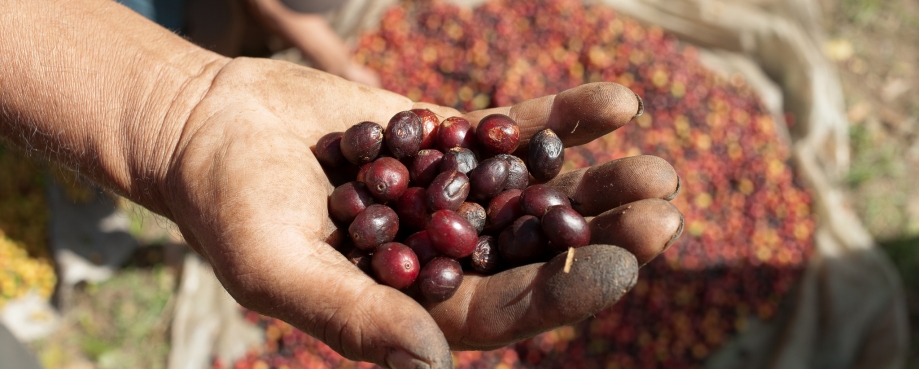
Verité, a non-profit working to illuminate labour rights violations in supply chains, has outlined the challenges for coffee farmers and workers due to Covid-19 in a recent report. At Union, we echo the very serious concerns they have raised over the impact on our farmer partners.
Things looked hopeful for coffee producers in December last year, when the price of coffee on the world market rose briefly in response to increased buying activity by roasters.
But this upward trend didn’t last and international coffee prices have now fallen nearly 30% from their December position, hovering around the $1 USD per pound mark.
“… as a result of the pandemic, there is a significant risk that working conditions will further deteriorate as crises usually affect the most vulnerable workers the hardest. The coffee industry must acknowledge that farmworkers are essential to ensuring the supply of coffee, and the sector must balance profit margins and long-term business goals with worker welfare through an emphasis on shared-value. … it is more important than ever that coffee retailers, roasters, traders, and producers double down on their commitments to improving working conditions in the coffee sector." Verite report
This is substantially below the Fairtrade minimum price and does not allow for ethical or sustainable coffee production. This price decline is fuelled by the market conditions; while there has been an increase in demand for coffee sold by supermarkets, there have been steep decreases in demand for coffee sold at cafés, which is generally high-end or premium specialty coffee that brings much higher prices for farmers.
For many coffee roasters under price pressure due the current economic circumstances, this comes at the right time. But for coffee farmers it is a different story. When prices are low, they often supplement their income with other activities such as working on neighbouring farms, remittances from family members working abroad, or growing and selling their own fruit and vegetables. None of which are possible under the Covid-19 quarantines, curfews and restrictions.
The vicious cycle
When the cost of growing coffee exceeds the selling price farmers receive for their coffee, farmers start cutting costs. This means paying workers less, opting for cheap but dangerous agrochemicals or completely stopping managing the farm. Abandoning the farm even for a couple of months starts a vicious cycle, resulting in low to no yields and even lower farm income in the future. The practice of farmers cutting out meals is recognized within the industry as “the thin (or starvation) months”, those just before the harvest when money earned from the previous season has run out.
When farmers do not receive a fair price for their crop, there is an increased risk of labour rights violations and poverty. Ambitious goals, such as earning a living wage and receiving a living income, seem unattainable. Instead of children being send to school, they are sent to work on the coffee plantation.
At Union, we have very serious concerns over the impact of COVID-19 on our farmer partners. In addition to the impact of low coffee prices covered above, there are health risks. Coffee grows mainly in developing countries with weak health care systems, fragile living and working conditions and poor access to basic facilities such as clean water and sanitation. In addition, the high average age of a coffee farmer (a threat to the long-term sustainability of coffee, alongside low coffee prices), combined with pre-existing health conditions and a lack of PPE, put farmers at an additional risk.
Another concern is the decline in demand; the conditions brought about by COVID-19 has caused the closure of restaurants and cafes. Some roasters have defaulted on existing coffee purchase contracts because their business operations have shrunk. This leaves farmers, already in difficult circumstances, desperate for new buyers for their coffee.
"Low and volatile world market prices have been the biggest threat to sustainable coffee production for many years. COVID-19 has exacerbated this. There is a big threat that companies do not adapt their long-term thinking. Not investing in your sourcing network or quality are easy short-term gains. But, what about the long-term? The pandemic is a test of the sector’s commitment to building a sustainable future for coffee." Verite report
Innovative solutions
On the positive side, we saw that most farmers we work with have dealt with the challenges described in Verité’s report in a very innovative way, creating clever solutions to protect the health of their community and to overcome logistic disruptions:
- Reducing transmission risks associated with transportation: instead of asking farmers to organise the transportation of coffee to central warehouses, cooperative managers sent trucks to visit the farmers, and observed social distancing and PPE guidance
- Rapid digitalisation: farmers can now call and text an agronomist with a picture showing the health condition of their plantations as farm visits and farmer training cannot take place
- Sharing information: farmers’ organisations were quick to develop radio messages, posters and information bulletins to advise members about Occupational Health and Safety .
But of course, this all comes a cost. And the most resilient and financially healthy organizations have been quickest and most able to react.
The long-term effect of COVID-19 on prices and demand for speciality coffee is still unknown. However, as the Verité report points out, in these uncertain times we must keep supporting our suppliers and partners in order to ensure sustainable coffee is available for the next generation of coffee enthusiasts to enjoy.
About Union Direct Hand-Roasted Coffee
Union has developed a coffee sourcing model called, Union Direct Trade. This initiative selects high quality coffee, through transparency, traceability, long-term relationships, fair prices and respect for human rights and the environment (governed by the Union Code of Conduct) in order to create an enabling environment in which farmers' organisations are able to quickly adapt to new situations.
Union only sources and sells premium speciality coffee, for both café and home customers, as we believe this is the path to sustainable coffee production.
